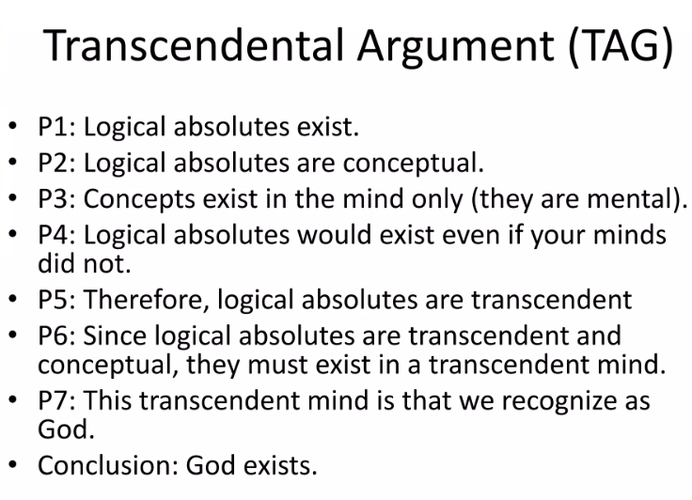fk732
Silver
- Joined
- Mar 26, 2025
- Posts
- 519
- Reputation
- 354
Im gonna show you why being an atheist is going against logic, and reason. And why every ' smart ' atheist that try to explain it with - logic and reason, will end up facing a wall.
definitions | contingent : A contingent being is one whose existence is not necessary; it exists but could have not existed. Its essence (what it is) is distinct from its existence (that it is).
necessary : A necessary being is one that must exist by its own nature; its essence and existence are identical. It cannot not exist.
Logics proves God :
Reason proves God :
Final conclusion,
Atheism ultimately undermines the very tools it relies on to argue for itself. To deny God is to deny the foundation of existence, the ground of reason, and the source of truth. Logic, morality, and meaning cannot exist as universal, binding realities without a necessary, intelligent being to sustain them. Yet every atheist argument presupposes these things: it uses reason to claim that reason itself has no ultimate basis. Without God, thought becomes arbitrary, truth becomes subjective, and the universe becomes a meaningless flux. To reject the divine is to step outside the framework that makes rational discourse, knowledge, and understanding possible. atheism is self-defeating: it cannot justify itself without appealing to what it denies.
definitions | contingent : A contingent being is one whose existence is not necessary; it exists but could have not existed. Its essence (what it is) is distinct from its existence (that it is).
necessary : A necessary being is one that must exist by its own nature; its essence and existence are identical. It cannot not exist.
Logics proves God :
God is what we call ' self sufficient ', or necessary. In him everything is hold unto existence in any instant. Wether its physical or spiritual its grounded in God. this allow us to be able to use reason and logic, for both of those things can only exist in a God.
Without God, the universe is just a set of contingent, purely material, and in the physical realm theres no logic nor reason, why? well its not something you can localise, its not in your brain, its not anywhere physically, logical absolute exist universaly indepandently from us.
is 1+1 equal to 3? no its 2. this is called the law of non contradiction ¬(A ∧ ¬A) : In plain terms: something cannot be true and false, in the same way and in the same moment. Do you agree with the law of non contradiction ( wich is a logical absolute ) ? yes -> continue reading
no -> if you say " its false " your assuming your statement is non con
contradictory in order for it to make any sense, self debunked.
the Transcendental argument.
- Logic, reason, and moral absolutes exist.
- These are immaterial, universal, invariant, and necessary realities.
- Such realities cannot arise from matter, motion, or chance.
- Therefore, their existence requires a transcendent, rational source.
- This source must be personal, rational, and self-existent. God.
- The denial of God presupposes God, because using logic requires the very framework only He grounds.
- Therefore, without God, logic, reason, and truth are impossible.
Conclusion, atheism is illogical and irrational.
Reason proves God :
One of the smartest man to ever live, saint Thomas aquinas gave us 5ways to know God using only reason, and we saw before that reason itself presupose God so literraly we dont even need those 5 ways but still great to have.
The Five Ways of St. Thomas Aquinas :
1. The Argument from Motion (The Unmoved Mover)
- Observation: Everything in motion is moved by something else.
- Problem: If every mover is moved by another, there would be an infinite regress.
- Conclusion: There must be a first, unmoved mover that initiates all motion.
2. The Argument from Efficient Cause (The First Cause)
- Observation: Everything that exists has a cause.
- Problem: A chain of causes cannot extend infinitely backward.
- Conclusion: There must be a first, uncaused cause that brings everything else into existence.
3. The Argument from Contingency (The Necessary Being)
- Observation: Many things in the universe are contingent (they could exist or not exist).
- Problem: If everything were contingent, at some point nothing would have existed.
- Conclusion: There must exist a necessary being whose existence is not contingent on anything else.
4. The Argument from Degree (Gradation of Perfection)
- Observation: Things in the world exist in varying degrees of goodness, truth, nobility, etc.
- Problem: Degrees imply the existence of a maximum by which all others are measured.
- Conclusion: There must exist a being that possesses all perfections to the fullest degree.
5. The Teleological Argument (The Argument from Design / Final Cause)
- Observation: Non-intelligent things act toward ends and achieve results that are orderly.
- Problem: Non-intelligent things cannot direct themselves.
- Conclusion: There must exist an intelligent being that directs all things toward their purpose.
Final conclusion,
Atheism ultimately undermines the very tools it relies on to argue for itself. To deny God is to deny the foundation of existence, the ground of reason, and the source of truth. Logic, morality, and meaning cannot exist as universal, binding realities without a necessary, intelligent being to sustain them. Yet every atheist argument presupposes these things: it uses reason to claim that reason itself has no ultimate basis. Without God, thought becomes arbitrary, truth becomes subjective, and the universe becomes a meaningless flux. To reject the divine is to step outside the framework that makes rational discourse, knowledge, and understanding possible. atheism is self-defeating: it cannot justify itself without appealing to what it denies.





